Taiwan CSP
Provide Feedback
CloseShare With Contacts
CloseShare With Contacts
CloseCopy Link
Closehttps://taiwancsp.shareableapps.com/
Tap and hold link above to copy to clipboard.
Delete Message?
Are you sure you want to delete this message?
An update is now available for this app!


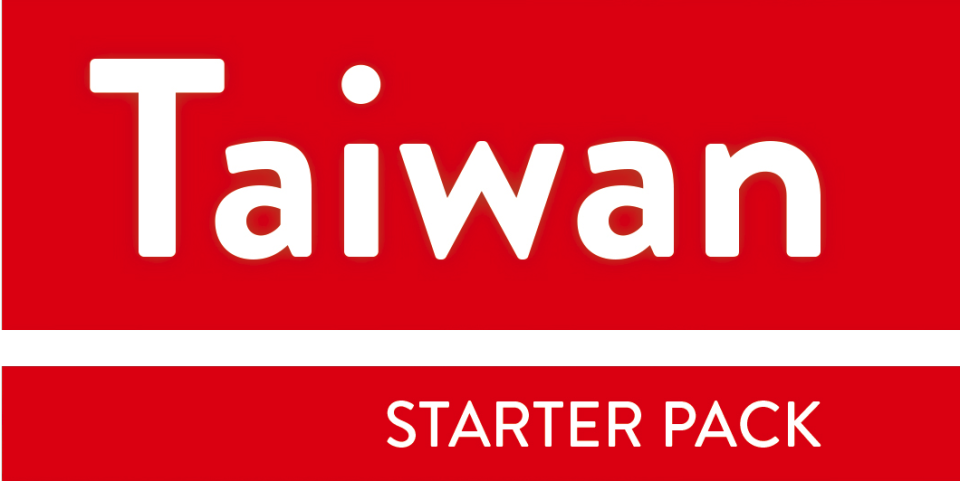
You successfully shared the app
https://taiwancsp.shareableapps.com/
Tap and hold link above to copy to clipboard.
Are you sure you want to delete this message?
You successfully shared the app
https://taiwancsp.shareableapps.com/
Tap and hold link above to copy to clipboard.
Are you sure you want to delete this message?
As one of the original four 'Asian Tigers', Taiwan's economic performance stunned the world in the second half of the 20th century. Today, with its highly developed economy, free-market environment and advanced IT industrial production chains, Taiwan continues to be a leading force contributing to Asia's economic prosperity. With a nominal Gross Domestic Product (GDP) of USD 508.85 billion (AUD 643 billion) in 2016, Taiwan is the 22nd largest economy in the world and the 5th largest in Asia. In addition, as one of the globe's biggest trading powers, Taiwan was ranked the world's 19th largest exporter and 15th largest importer of merchandise in 2016. In particular, Taiwan plays a central role in the supply chain of the global IT industry. Key features that make Taiwan attractive to Australian businesses:
In 2016, Taiwan was Australia's 9th most important merchandise export market (AUD 7.6 billion) and the 14th largest service export destination (AUD 1.1 billion). Australia is a primary exporter of coal, iron ores, aluminium and agricultural products to Taiwan, and Taiwan's exports to Australia, which include telecommunications equipment, refined petroleum and computers. The major Australian service exports to Taiwan are travel and education.
Taiwan has a population of 23.5 million, similar to that of Australia. Businesses and products that enjoy advantages in Taiwan are:
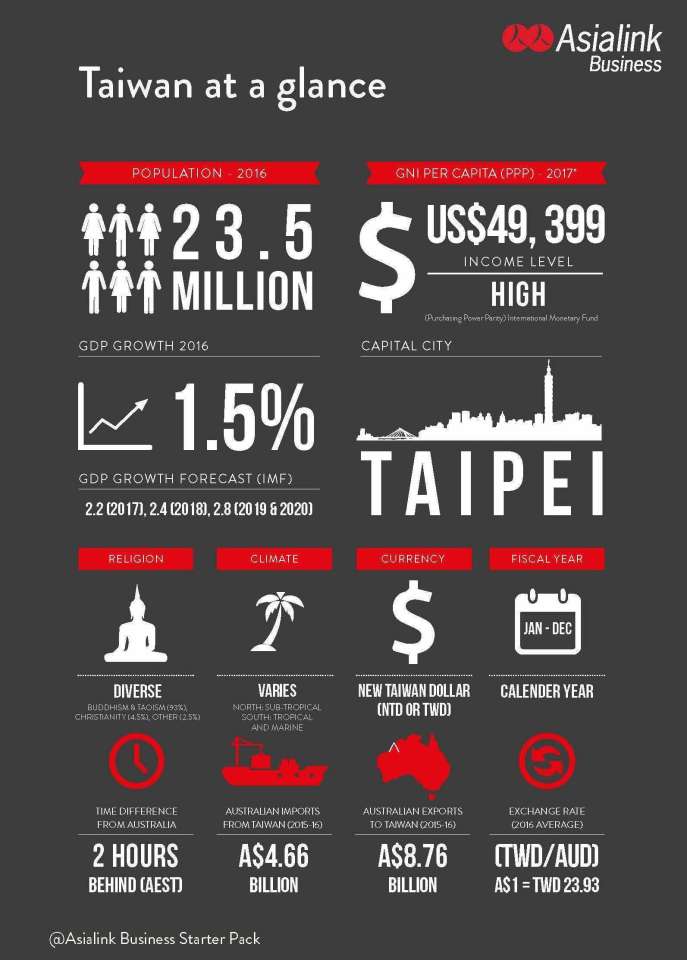
You successfully shared the app
https://taiwancsp.shareableapps.com/
Tap and hold link above to copy to clipboard.
Are you sure you want to delete this message?
Total area: 35,980 square kilometres
Land use: agricultural land (22.7%), arable land (16.9%), permanent crops (5.8%), other (77.3%)
Taiwan covers the main island of Taiwan, the Penghu Archipelago, Kinmen (Quemoy), Matsu, and other surrounding smaller islets. The major cities, often referred to as the six special municipalities (Taipei, Kaohsiung, New Taipei, Taichung, Tainan, Taoyuan), are all on the main island of Taiwan. The capital is Taipei, situated at the northern tip of the island. It is 180 kilometres from the southeast coast of mainland China across the Taiwan Strait and has a total area of 35,980 square kilometres.
As Taiwan sits astride the Tropic of Cancer, there are distinct weather conditions for the north and south. The northern and central part of Taiwan island has a subtropical climate with hot, humid summers and cool winters. In contrast, the south enjoys a tropical and oceanic climate. It is warmer and there is less seasonal variation in temperature. The East Asian Monsoon largely influences Taiwan's climate. Precipitation is abundant. In summer (June to August), expect heavy downpours with thunderstorms and occasional typhoons. Autumn (September to November) usually has the heaviest rainfall.
During the age of discovery in the 16th century, Europeans arrived in Taiwan. The Portuguese are commonly believed to be the first Western arrivals, landing in the early 1590s and dubbing the island llha Formosa (beautiful island) in Portuguese, widely used for hundreds of years. Dutch and Spanish traders followed.
In 1662, a loyalist of the Ming dynasty expelled the Dutch. Nevertheless, in 1683, Taiwan became a province of the Manchurian Qing Empire for the next 200 years. After the First Sino-Japanese War in 1895, Taiwan became a colony of Japan until the end of World War II. While Japanese occupation was at times repressive, it was also a period of rapid economic development.
After the Japanese surrender, Taiwan was turned over to the Republic of China, headed by Chiang Kai-shek and his Nationalist government (or Kuomintang). In 1949, the KMT were defeated by the Communist Party led by Mao Zedong. Chiang Kai-shek, his government and 1.2 million mainland Chinese, withdrew to Taiwan.
Tension between the Beijing-based PRC and Taiwan-based ROC remained, especially in the environment of the Cold War. After the outbreak of the Korean War in 1950, the United States realised the strategic importance of Taiwan and sent its Seventh Fleet to the Taiwan Strait, and promoted the creation of the Southeast Asia Treaty Organisation and a Mutual Defence Treaty with Chiang Kai-shek in 1954.
Economically, Taiwan experienced rapid industrial development throughout the 1950s and 1960s. However, the ROC lost its international status in 1971 when the United Nations declared its recognition of the People's Republic of China as the sole government representing China. After the change in the US foreign policy towards China and the subsequent Sino-American normalisation in 1972, close allies of the US gradually ended official diplomatic relations with Taiwan.
Nevertheless, Taiwan emerged as one of the so-called Asian Tigers. The cross-strait relationships have shown some improvement since the end of the 1980s. Most governments, including Australia, recognise the PRC as the sole legal government of China and support the PRC's One China Policy. Taiwanese authorities have adopted a flexible approach known as 'viable diplomacy'. Under this approach, relationships between Taiwan and China in terms of business cooperation and people-to-people issues are very closely linked.
Taiwanese culture is a mixture of indigenous heritage along with Chinese, Japanese and Western traditions. The major ethnic group is the Han Chinese. The Chinese are largely divided into three groups, based on culture and dialect: Hoklo, Hakka, and mainland Chinese. A diverse group of aboriginal people including Amis, Atayal, and Bunun also inhabit Taiwan. This group numbers about 360,000 people.
The official language is Mandarin Chinese, although Minnanese (or Hokkien) also is common. Hakka dialect and aboriginal languages are well preserved and many elderly Taiwanese speak fluent Japanese. The most popular and important foreign language is English, a compulsory school subject. Traditional characters, also known as full-form characters, are used for writing Mandarin in Taiwan.
The major religions in Taiwan are Buddhism (Chinese Buddhism and Tibetan Buddhism) and Taoism. Some 4.5 per cent are Christian. Taiwanese society has been greatly influenced by Confucianism, with social norms including filial piety and respect for seniority and the elderly, highly valued.
Taiwan has a multi-party political system. Its government is divided into central, provincial and municipal, in addition to county and city levels. The central government comprises the Office of the President and five branches (or Yuan). The president and vice-president are directly elected. The five branches of the central government are the Executive Yuan, the Legislative Yuan, the Judicial Yuan, the Examination Yuan, and the Control Yuan. The Executive Yuan (Cabinet), headed by the premier, directly appointed by the president, is the highest administrative branch, responsible for making and implementing government policy. The Legislative Yuan is the sole law-making body.
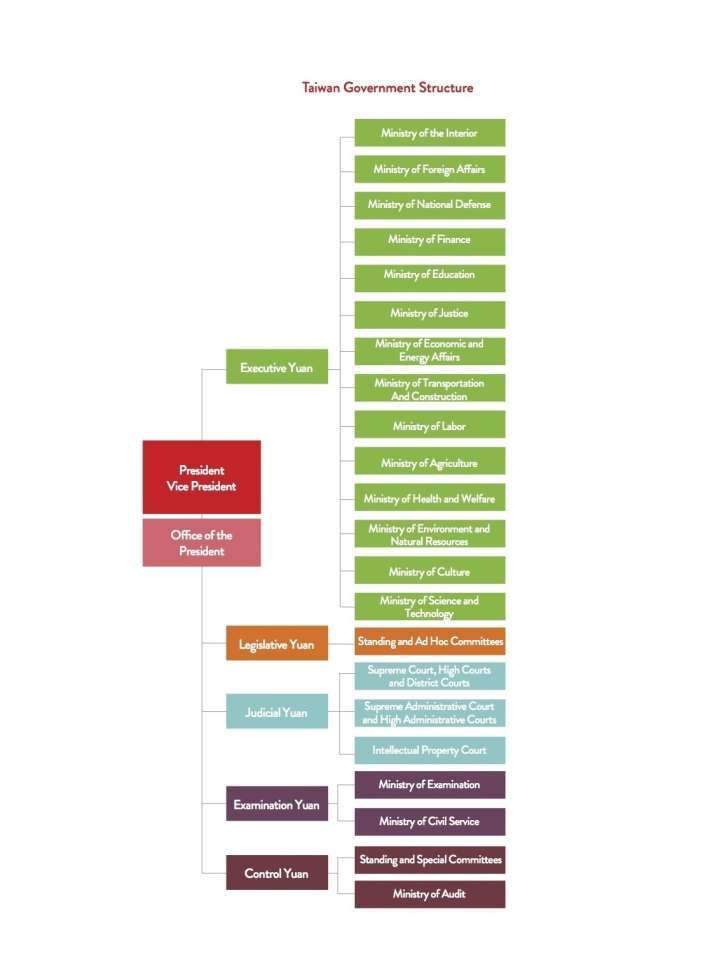
Among the nearly 150 registered political parties in Taiwan, the two most influential are Kuomintang (KMT) and the Democratic Progressive Party (DPP). Political parties in Taiwan are commonly distinguished as being “pan-blue" (pro-China) or “pan-green" (pro-independence). KMT belongs to the blue camp, the DPP in the green.
Taiwan is an advanced, high-income economy with a dynamic, open market. In terms of nominal GDP, it is ranked as the 22nd-largest economy in the world and fifth-largest in Asia. Its GDP per capita expressed as purchasing power parity reached USD 47,811 (AUD 60,405) in 2016.
Until the mid-1960s Taiwan's economy was dominated by agriculture. By the 1980s, Taiwan began relocating its low-technology manufacturing offshore, especially to China. More recently some of Taiwan's more advanced, high-tech industries have followed suit. Today, Taiwan is increasingly a tertiary economy, with services accounting for over 60 per cent of output and more than half of all employment.
Taiwan's economy remains export-oriented. In 2016, Taiwan was ranked the world's 15th largest exporter and 19th largest importer of merchandise.
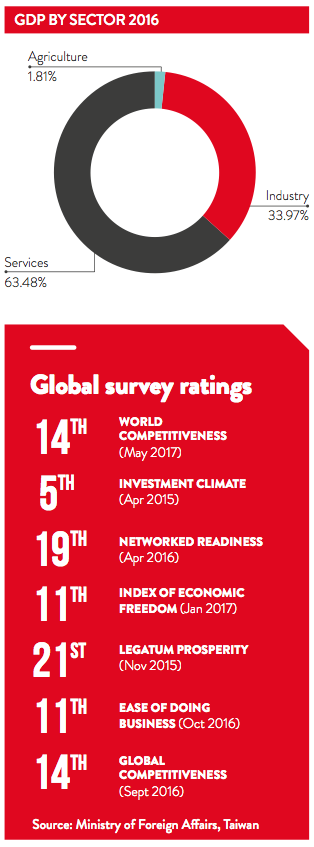
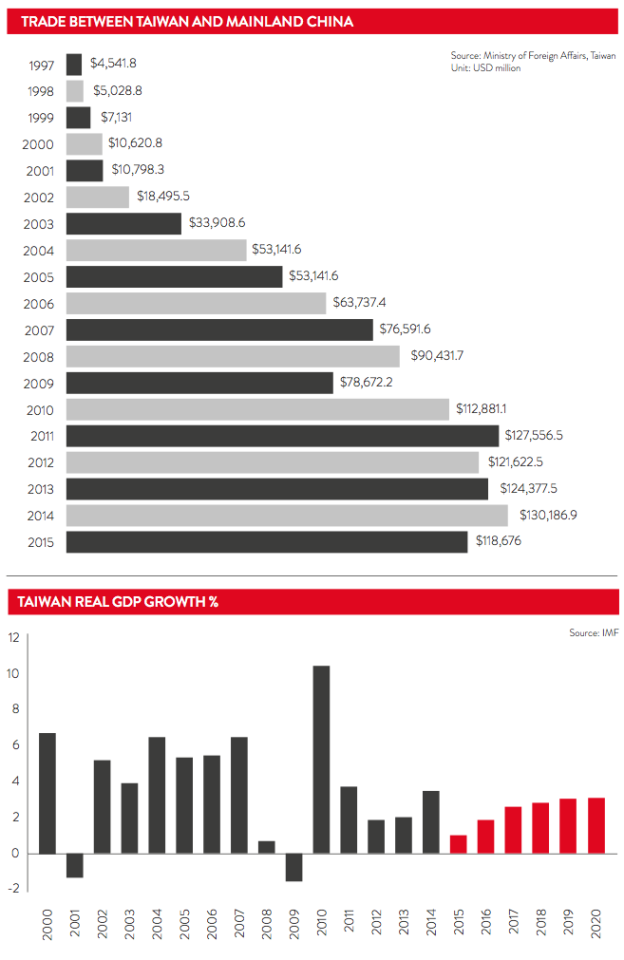
Taiwan's legal system is mainly based on civil law, with emphasis on codified statutes rather than case law. As such, law codes and regulations are firmly and clearly defined. The Supreme Court heads Taiwan's three-tiered court system.
Taiwan's infrastructure supports its dense population and dynamic economy. t ranked 20th out of 138 economies in the World Economic Forum's Global Competitiveness Index for quality of overall infrastructure in 201.
Taiwan has seven international harbours and18 airports, including three international ones in Taipei, Taoyuan and Kaohsiung. It has excellent public and private transport services and boasts advanced ICT infrastructure.
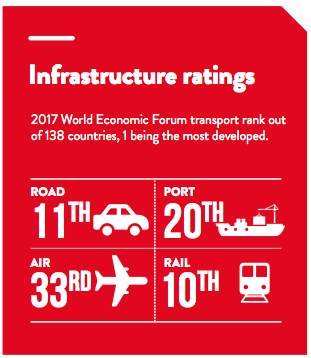
You successfully shared the app
https://taiwancsp.shareableapps.com/
Tap and hold link above to copy to clipboard.
Are you sure you want to delete this message?
Like most governments and the United Nations, Australia recognises the PRC as the sole legal government of China. Australia does, however, actively foster trade, economic and cultural collaboration and Australia supports Taiwan's participation in international organisations and conferences where appropriate.
The substantial trade and people-to-people links are managed through unofficial channels. The Taiwan Economic and Cultural Office, which has four offices in Australia (Canberra, Sydney, Melbourne and Brisbane) represents Taiwanese interests in Australia. In Taiwan, the Australian Office in Taipei represents Australian interests.
Taiwan is Australia's ninth largest merchandise export market and 15th-largest source of merchandise imports. Australia's merchandise exports to Taiwan in 2016 were worth AUD 7.6 billion. Major exports were coal, iron ore, aluminium and copper. Australia continues as a major exporter of agricultural products to Taiwan, the most important items being beef, wheat and dairy. Imports from Taiwan include telecommunications equipment, refined petroleum, cycles, and computers. Two-way services trade totalled AUD 1.3 billion in the 2016 calendar year. Taiwan is a major tourism and education market for Australia, and Taiwan and Australia have a mutual working-holiday-maker (WHM) arrangement. Some 46,000 Taiwanese live permanently in Australia.
You successfully shared the app
https://taiwancsp.shareableapps.com/
Tap and hold link above to copy to clipboard.
Are you sure you want to delete this message?

You successfully shared the app
https://taiwancsp.shareableapps.com/
Tap and hold link above to copy to clipboard.
Are you sure you want to delete this message?
Companies looking to enter the Taiwanese market have a number of location options. From providing products and services to wealthy consumers in major cities to engaging in manufacturing in well-integrated industrial parks, Taiwan offers a number of options to support business growth. Taiwan is divided into six special municipalities that have populations greater than 1.25 million and are cultural and economic centres:
The government has developed new science parks, industrial parks and free trade zones (FTZs) that help provide an attractive operating environment for businesses.
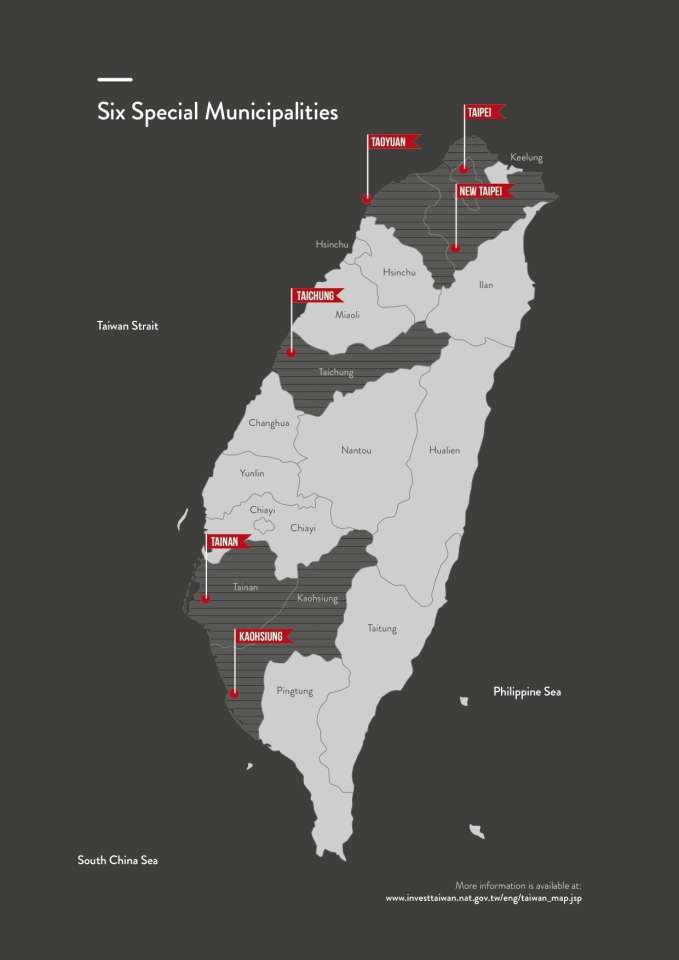
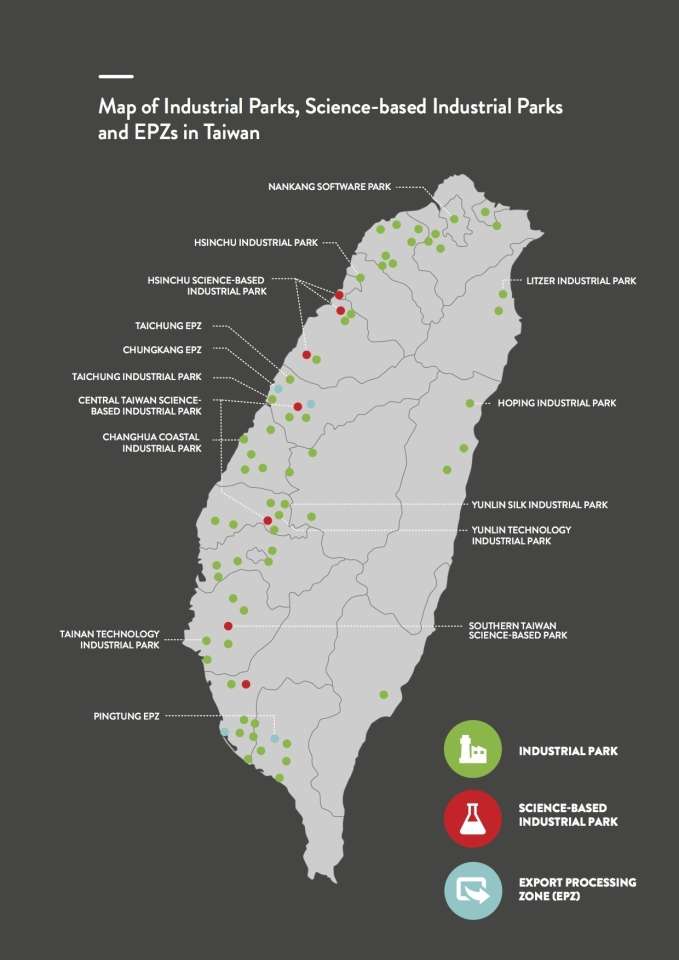
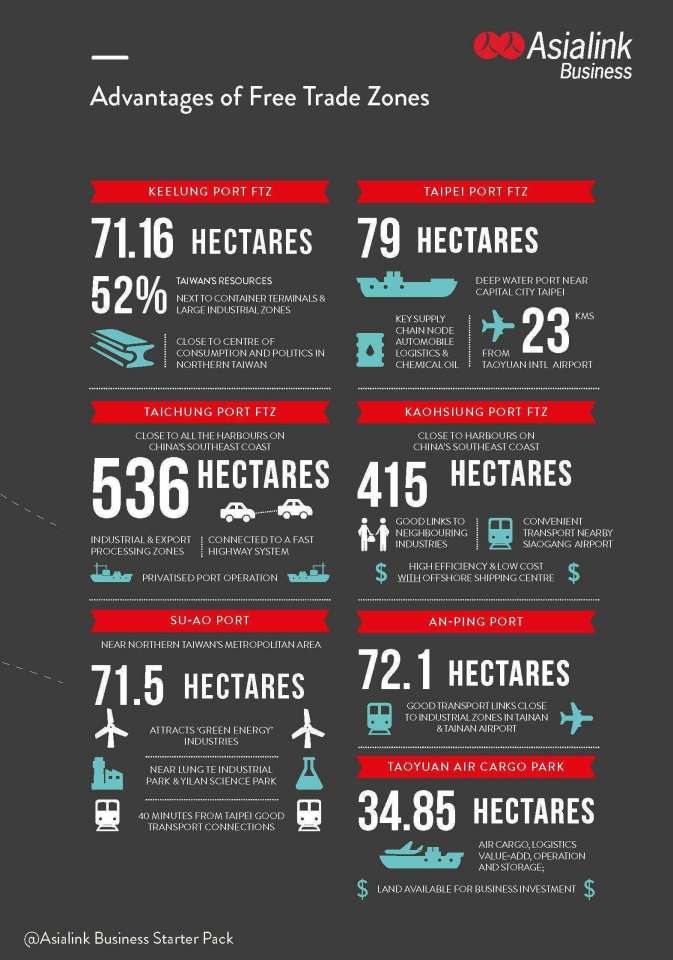
Make sure the interpreter is professionally trained and experienced, and has an effective technical understanding of your business and approach.
The main differences between operating in Taiwan compared with Australia include a longer cash flow cycle, proximity to clients, foreign exchange risks, greater difficulty accessing Australian finance, and a longer time frame to recover upfront costs.
A wide range of funding options exists, with various grants, venture capital and equity-sharing deals increasingly commonplace. However, banks remain the easiest and most approachable source of funding. To research the venture capital market, go to the Australian Private Equity and Venture Capital Association Limited website at avcal.com.au
Government assistance, federal and state, is available to Australian businesses, especially exporters, through grants, loan facilities and reimbursement schemes. These include Export Finance Insurance Corporation (Efic), Australia's export credit agency, and the Export Market Development Grants (EMDG) scheme, administered by Austrade. Full information can be found at efic.gov.au and austrade.gov.au
Individual state and territory government websites also contain information on what financial assistance they can offer. Other sources of finance include a joint venture arrangement or an equity investment from a sophisticated individual investor or 'angel investor'.
Services include listing securities, stock trading, market surveillance, clearing and settlement, securities borrowing and lending system, and securities information service. See: twse.com.tw/en/.
The main mission of the TPEx is to assist small to medium-sized companies and facilitate the development of emerging and high-tech industries. See: tpex.org.tw.
Taiwan offers 'tax related incentives' that provide tax concessions, and 'non-tax related incentives' that aim to create a high-quality, cost-efficient investment environment. More information on investtaiwan.nat.gov.tw.
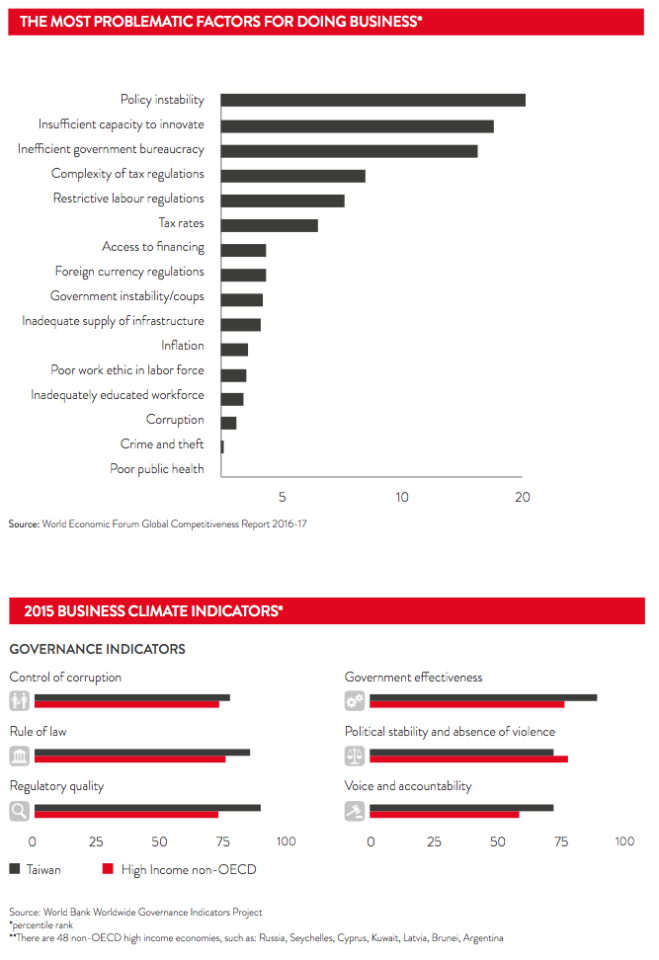
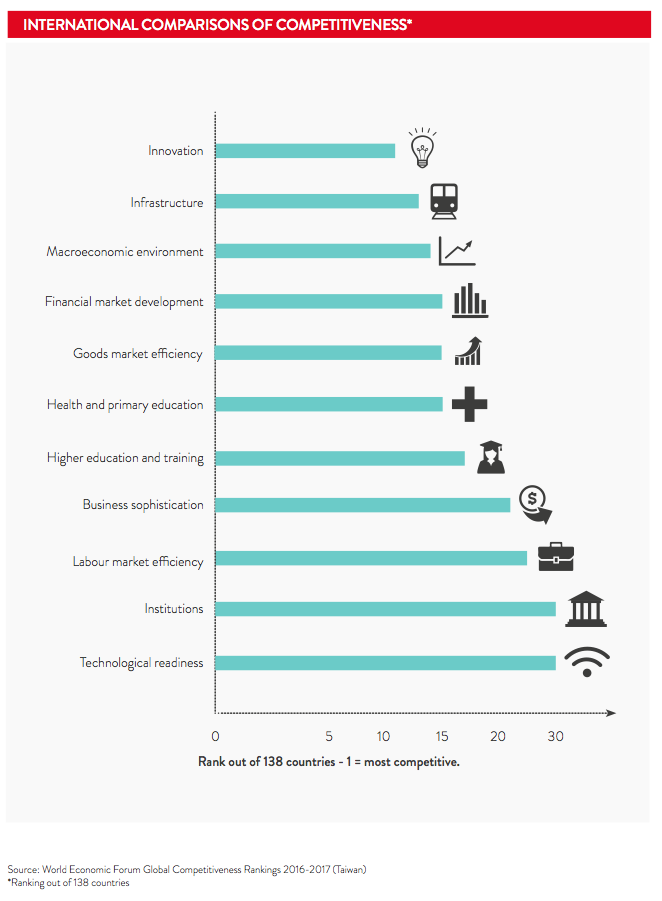
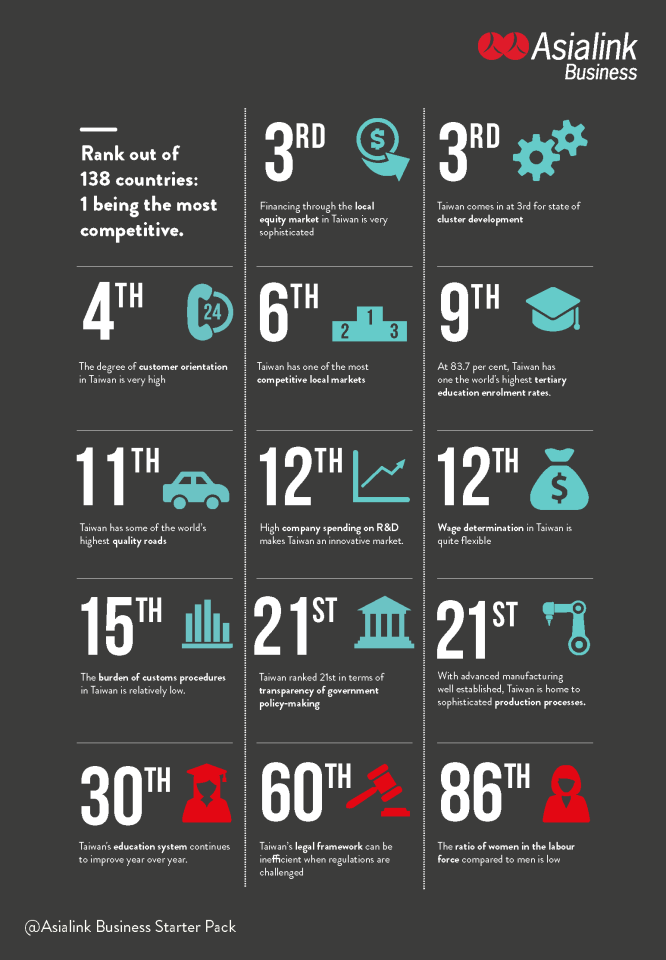
Taiwan's overall investment climate is sound thanks to its pro-business government policies. According to the World Bank Worldwide Governance Indicators Project, Taiwan scored relatively high for all aspects of governance. With regard to the level of corruption, Taiwan is ranked as low as 26th out of 138 countries in the world for irregular payments and bribes and fourth in East Asia. Taiwan also ranked 11th out of 180 countries in the 2017 index of economic freedom. Taiwan enjoys a relatively stable and positive credit rating from Fitch Ratings (AA-), Standard & Poor's (AA-), and Moody's (Aa3).
However, due to issues surrounding Taiwan's international status and the potential political conflicts with China, political stability may be a concern for international investors.
Taiwan has made great efforts to create an environment that offers better IP protection. Australian businesses are less likely to encounter IP issues in Taiwan, but research is recommended. The Intellectual Property Office, responsible for IP rights, copyrights, patent, and trademark matters, is on: tipo.gov.tw.
You successfully shared the app
https://taiwancsp.shareableapps.com/
Tap and hold link above to copy to clipboard.
Are you sure you want to delete this message?
The InvestTaiwan Service Centre (ITSC) is a good place to start for valuable information for existing businesses and prospective investors: investtaiwan.nat.gov.tw.
Research organisations in Taiwan, including international professional and accounting firms such as PricewaterhouseCoopers, can be a major source of information. Austrade provides a range of services for Australian firms going offshore. The Australian Government's Export Market Development Grant (EMDG) scheme can help meet costs, and state and territory governments may provide grants. Visit austrade.gov.au.
You will need to visit Taiwan to confirm research results, develop a deeper understanding of potential markets, and make contacts. Visit before entering into any agreements with prospective agents, distributors or other business partners. Plan your trip at least six weeks in advance and arrange in-country assistance to set up of your program. This will help you see the right agents and customers who will be briefed and screened for interest and suitability. Having company and product information and business cards is vital for developing business relationships.
Do some background reading and do some research online. A good website is your corporate brochure. Make sure that contact details are easy to find and use. One of the best ways to meet potential customers or business partners is at the numerous trade shows and exhibitions in Taiwan throughout the year.
Don't waste time in Taiwan doing what you can do in Australia. Various organisations have training courses or seminars that can expand your knowledge about doing business in Taiwan, including Asialink Business, Austrade, Export Council of Australia (ECA) and state and territory governments.
Joining a business association is a good way to learn more about the local business community and to meet colleagues:
Australian-Taiwan Business Council: The ATBC has fostered business ties among Australia, Taiwan and China since 1982. Website: atbc.asn.au/home.
Australia New Zealand Chamber of Commerce in Taipei: Provides a wide range of services, including creating business and social networking opportunities. Website: anzchamtw.org.
You successfully shared the app
https://taiwancsp.shareableapps.com/
Tap and hold link above to copy to clipboard.
Are you sure you want to delete this message?
Now that you have decided to set up in Taiwan, there are more issues to consider. What type of business structure will you have? Will it be a joint venture with a Taiwanese partner? A Taiwan-registered company? Or simply a branch or representative office?
There are multiple channels of entry open to foreign investors; the one you choose should fundamentally support your business objectives. Taiwan is one of the easiest locations in which to do business in Asia. The company structures available are:
Company limited by shares and limited company are the most common in Taiwan. The unlimited company is rarely used as directors bear unlimited personal liability. Closely held company limited by shares is designed for start-ups, allowing it to offer shares as part of an employment package or raise funds.
Other considerations:
Subsidiary: Allows a business to engage in just about all business activities. It is, however, the most time-consuming and expensive option. A subsidiary is an independent entity from its parent company. Company limited by shares and limited liability company are the most common structures for foreign businesses setting up a subsidiary.
Joint venture: Establishing a joint venture with a Taiwanese firm is popular in the ICT and manufacturing sectors.
Branch office: They allow businesses to conduct profit-making activity in Taiwan. The parent company remains liable for branch office activities and debts.
Sole proprietorship: While foreign nationals can establish sole proprietorships, they are not popular as the individual has full personal liability. They do not need to be registered.
Partnerships: Like a sole proprietorship, partnerships are quick and simple to establish by two or more people who have unlimited personal liability for the business.
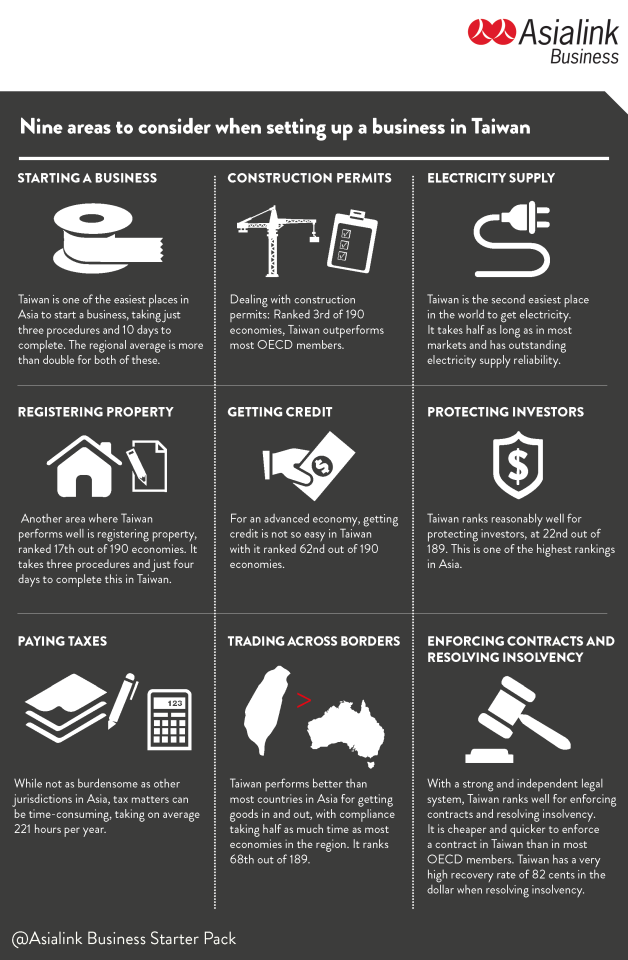
You successfully shared the app
https://taiwancsp.shareableapps.com/
Tap and hold link above to copy to clipboard.
Are you sure you want to delete this message?
Taiwan has long been an attractive destination for foreign investment in manufacturing thanks to its strategic location, advanced industrial clusters, skilled workforce and relatively low land cost. In recent years, Taiwan has become the second largest IT hardware manufacturer in the world and is renowned for its high-tech industries. Taiwan has been chosen as a partner by such global brands as Apple, HP, Dell, IBM, and Corning.
The manufacturing sector is the largest part of its industrial sector, and electronic components remain the largest segment of the sector. International manufacturers can choose from a wide range of high-quality industrial parks.
It is recommended that any Australian business planning to establish manufacturing operations in Taiwan form a joint venture with Taiwanese companies. A joint venture not only can reduce business risk, but also offer access to Taiwan's expertise, and knowledge about manufacturing in China. Since 2009, Taiwan has become a great testing platform for the huge market in China.
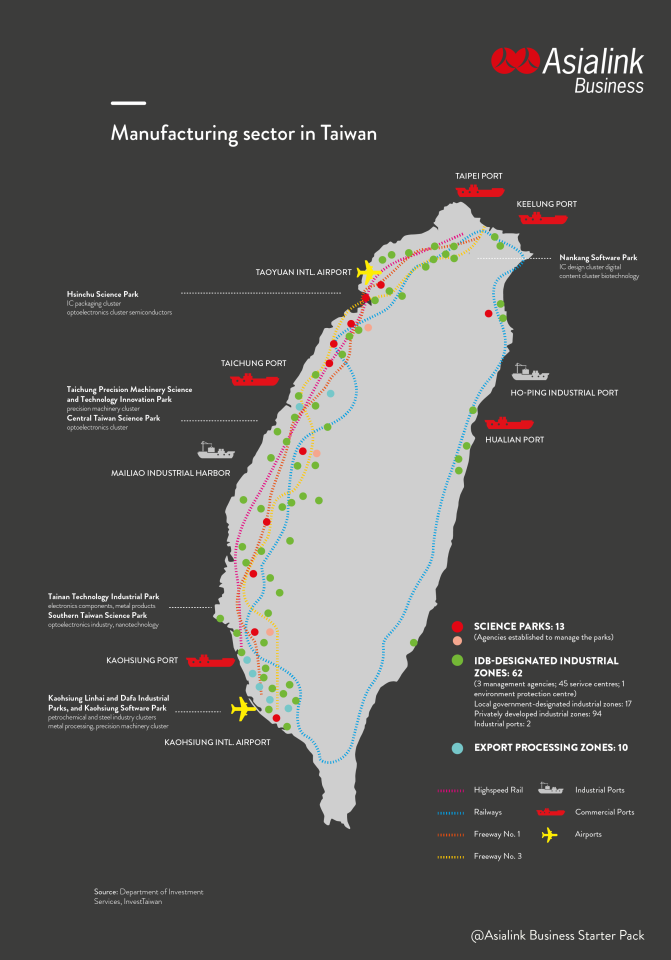
You successfully shared the app
https://taiwancsp.shareableapps.com/
Tap and hold link above to copy to clipboard.
Are you sure you want to delete this message?
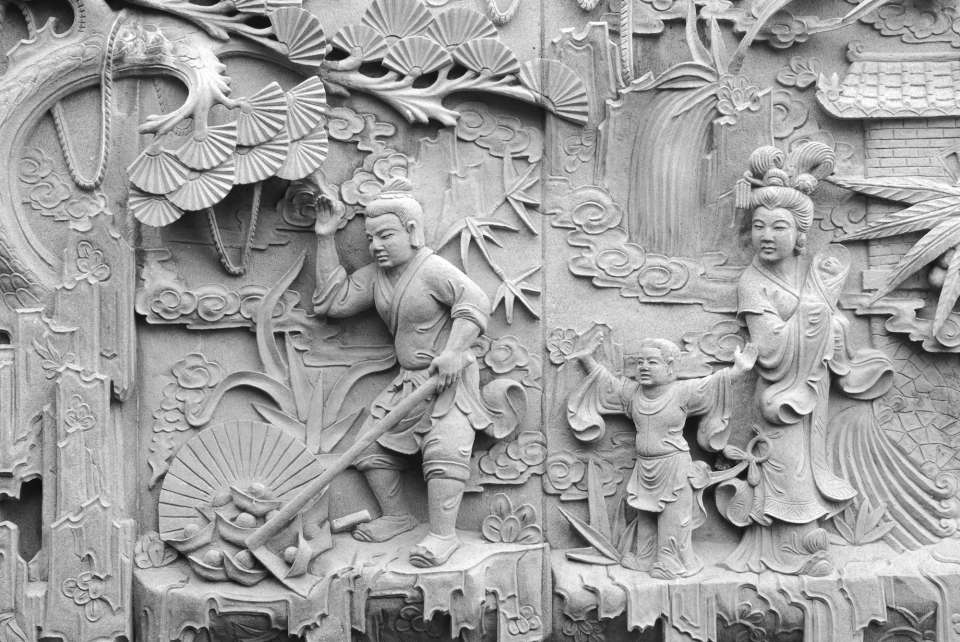
You successfully shared the app
https://taiwancsp.shareableapps.com/
Tap and hold link above to copy to clipboard.
Are you sure you want to delete this message?
Most Australian firms rely on agents or distributors to represent their businesses and sell their products in international markets. An agent does not take ownership of the goods, and is generally paid a commission on sales. A distributor buys the goods and resells them. In general, a relationship with an agent is favoured by foreign investors and many Taiwanese firms because it gives the investor more control over sales and marketing while reassuring Taiwanese firms of their commitment to Taiwan.
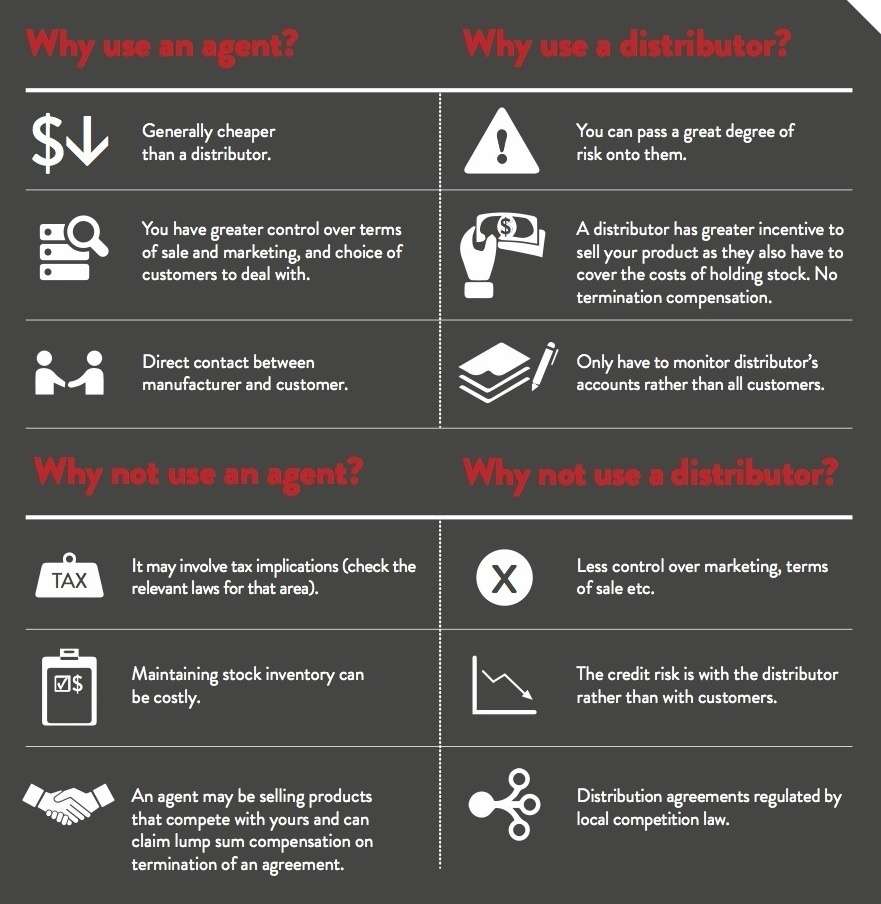
You successfully shared the app
https://taiwancsp.shareableapps.com/
Tap and hold link above to copy to clipboard.
Are you sure you want to delete this message?
Taiwan's e-commerce market has grown robustly in recent years, largely driven by its high internet penetration rate, smartphone adoption, and favourable government policies. Taiwan is one of the most highly connected markets in Asia, and it was expected that the e-commerce market would soon dominate more than half of the traditional retail market, with estimated sales value of NTD 4 trillion (AUD 168 billion) per year.
In addition to the local online retail platforms such as Yahoo! Kimo, PC Home and PayEasy, online shoppers also use China-based online retailer Taobao, Rakuten Ichiba Taiwan (Japan-based), and Ruten (formed by eBay). The widespread use of mobile devices has contributed to the rapid growth of online sales. Between 2015 and 2020, the percentage of smartphone users in Taiwan is expected to increase from 69.9 per cent to 79.9 per cent. According to Google's Consumer Barometer Report 2015, almost half of Taiwan's digital shoppers compare choices online using a smartphone, before making a purchase.
The adoption of e-payment in Taiwan is relatively low and cash on delivery is still a popular e-commerce payment method. However, legislation has enabled banks and non-bank entities to provide third-party payment services to improve the e-payment landscape and provide more confidence for online shoppers.
You successfully shared the app
https://taiwancsp.shareableapps.com/
Tap and hold link above to copy to clipboard.
Are you sure you want to delete this message?
The number of direct sellers in Taiwan has declined in recent years, largely driven by the growth of the e-commerce market. However, the sellers have continued to grow their customer bases. Major products sold via direct selling in Taiwan are skincare, healthcare products and household items. The Taiwan Direct Selling Association ( dsa.org.tw) has taken on the role of linking the government, businesses, and consumers.
You successfully shared the app
https://taiwancsp.shareableapps.com/
Tap and hold link above to copy to clipboard.
Are you sure you want to delete this message?
Thanks to its dense population and energetic market, Taiwan is a prime target for international franchise expansion. With more than 2,500 franchise systems and over 150,000 franchise units, it is one of the most franchised countries in the world, particularly in the retail, food and beverage, healthcare, and service sectors.
Taiwan's chain and franchise industry is very competitive and has become one of the driving forces behind Taiwan's economic growth. Australian investors looking at franchising should consult professional advisers before signing any agreements.
You successfully shared the app
https://taiwancsp.shareableapps.com/
Tap and hold link above to copy to clipboard.
Are you sure you want to delete this message?
Depending on the features of your product and your sales budget, you can use various channels to promote your business. Looking for an advertising agency can be a good start to understanding the market.
Show and tell: As a regional hub and major international trading centre, Taiwan hosts a wide range of trade shows and exhibitions, attracting suppliers and buyers from the rest of the world, especially Asia. Information about past and upcoming events is available on the Taiwan International Trade Shows website: taiwantradeshows.com.tw.
Digital and traditional: Taiwan is renowned for its free and dynamic media environment with more than 2,000 newspapers, 8,122 magazines and 7,160 TV and radio program production companies registered in 2011. TV remains the most popular media platform in Taiwan, followed by internet, radio and print media. Digital media is everywhere and is an effective way to build brand image and reach consumers.
Cultural considerations: It is important to think about how you use Chinese language and reflect the local culture and symbolism when marketing and advertising in Taiwan. Company or product names may have an embarrassing or negative meaning when translated into Chinese. Symbolism is important, with strong meanings attached to numbers and colours. How Chinese characters are written can affect the message. Seek professional advice to avoid traps.
You successfully shared the app
https://taiwancsp.shareableapps.com/
Tap and hold link above to copy to clipboard.
Are you sure you want to delete this message?
Taiwan has strict labelling requirements, especially when it comes to food. Check with the Taiwan Food and Drug Administration (TFDA) under the Ministry of Health and Welfare ( fda.gov.tw) or Austrade before exporting to Taiwan.
You successfully shared the app
https://taiwancsp.shareableapps.com/
Tap and hold link above to copy to clipboard.
Are you sure you want to delete this message?
You successfully shared the app
https://taiwancsp.shareableapps.com/
Tap and hold link above to copy to clipboard.
Are you sure you want to delete this message?
Taiwan's culture is rich and diverse; the Chinese heritage of most of its population is mixed with aboriginal customs and foreign traditions. Taiwan's society and culture have been greatly influenced by Confucian philosophies. The Taiwanese place great emphasis on duty, loyalty, honour, filial piety and respect for age. They also highly value diligence, humility and sincerity.
Greetings: Shaking hands has become a very common, and people may nod or bow their heads slightly when shaking hands at the first meeting. Always greet the oldest and most senior person first to show your respect for seniority.
Names and titles: In general, Taiwanese provide their names in the traditional Chinese way, with the family name followed by given name. Address your Taiwanese host or business partners with appropriate titles followed by family names, until you are invited to call them by their given names. Address married women using Ms plus their maiden names, unless otherwise directed.
Business cards: The exchange of business cards is customary. Make sure you enough as hundred may be needed even for a short business trip. Offer and receive a card using both hands and read the card to show interest and respect. It is customary to print your name, title, and company information in English on one side, and in Chinese on the other.
Dress code: Most people in Taiwan dress similarly to those in the West. Take off shoes when entering someone's home. In business, men wear suits and ties with leather shoes. Women wear blouses with business skirts or pantsuits, generally in blue or grey.
Face: The concept of 'face' plays an important role in business and personal interactions. It is closely related to a person or a company's reputation, dignity, and prestige. Embarrassing someone in public can end a relationship. However, Australian business people should not be overly worried about it. The most important thing is to show respect by being polite and punctual.
You successfully shared the app
https://taiwancsp.shareableapps.com/
Tap and hold link above to copy to clipboard.
Are you sure you want to delete this message?
Investing in relationships is key to success. The strength of business relationships can determine many aspects of commercial life, including gaining credit, procurement and contracting, and navigating bureaucratic processes. It often involves large amounts of face-to-face time with a person of similar age and status.
General knowledge: Demonstrating what you know about Taiwan's geography, history and food will please your hosts and make them more open in communications. A comprehensive knowledge of Taiwan shows strong commitment to the market.
Formal introduction: In Taiwan, who you know is important. Being introduced to a prospective business associate through an intermediary is an ideal start for building a business relationship.
Effort: A strong relationship requires a conscious and continued effort, including frequent business visits to Taiwan and regular communication (preferably CEO/company director to CEO).
Gifts: Gift-giving is a common practice in Taiwanese business culture. It is polite to present or receive a gift with both hands and open the gift in private. Specialities from your country or products featuring your company's logo would be welcomed. Avoid giving or receiving any gifts of significant value. It is crucial to know which particular goods, colours, and numbers are taboo. Some objects are best avoided, including clocks, handkerchiefs, straw sandals, white flowers or chrysanthemums that are associated with death or funerals. The numbers 4 and 13 are unlucky, the Taiwanese like 6 and 8. Odd numbers are perceived as a sign of bad luck.
Dining and socialising: Eating, drinking and other social activities play an important role in Taiwanese business culture. In general, dining is elaborate. You and your team may be treated to as many as 20 courses at a banquet. The host will pay for the meal, but it is polite for the guest to offer to pay, without being overly insistent. A good reason is needed to decline an invitation.
Chopsticks and toast: Try to learn how to use chopsticks, but never stick them upright in your rice or other food bowl as that is how people use them to honour the dead at funerals. Toasts are common at banquets and drinks in Taiwan. The host usually makes the first toast, welcoming the guests. Returning a toast is standard practice, although they need not be lengthy.
The main agencies and their areas of licensing authority for foreign investors are:
Other useful departmental and association websites include:
You successfully shared the app
https://taiwancsp.shareableapps.com/
Tap and hold link above to copy to clipboard.
Are you sure you want to delete this message?
Communication: Being patient and flexible is key. The Taiwanese communicate in a more indirect way, due to the importance of 'saving face' and maintaining harmony. Your Taiwanese counterpart is likely to avoid answering with a direct 'no'. Instead, they will respond by saying, “I am not very sure", or “We may want to talk about it again next time".
Setting up a meeting: Schedule business meetings well in advance, and preferably send a confirmation email a few days before the meeting.
Structure of meeting: The initial meeting normally begins with formal introduction of the delegations, followed by general topics and the purpose of the meeting. The primary purpose is to build relationships.
Seating arrangements: Normally by seniority, with most senior members seated opposite each other.
Ending a meeting: Recap points and undertakings that have been agreed, and arrange and agree to next steps. Gifts may be exchanged at this point at the first formal meeting. Guests leave before the hosts.
Negotiation: Taiwanese companies prepare well for negotiations, prefer to negotiate as a team, and often have highly skilled negotiators. Bargaining is common, so do not make your best offer right at the start.
Contracts: Business people in Taiwan tend to rely more on personal relationship rather than written documents. A signed contract can also be altered after a 'final' agreement. Though maintaining your own principles and bottom line is important, keep in mind: When in Rome ...
You successfully shared the app
https://taiwancsp.shareableapps.com/
Tap and hold link above to copy to clipboard.
Are you sure you want to delete this message?
Taiwan is a safe place for doing business. Corruption and bribery are rare, and it is unusual for foreign business people to be the target of scams or fraud. However, conducting due diligence is important to avoid commercial pitfalls. Taiwan has a large number of professional services and legal firms that can assist.
Dispute resolution: The Chinese Arbitration Association, located in Taipei, is a leading arbitration centre in the Asia-Pacific region. For more information, visit: arbitration.org.tw.
Scams: Taxi and ATM scams as well as credit card fraud through telephones are not uncommon. Watch for alerts at scamwatch.com.au.
You successfully shared the app
https://taiwancsp.shareableapps.com/
Tap and hold link above to copy to clipboard.
Are you sure you want to delete this message?
You successfully shared the app
https://taiwancsp.shareableapps.com/
Tap and hold link above to copy to clipboard.
Are you sure you want to delete this message?
Taiwan publishes a list of industries closed to foreign investment, predominantly for reasons security or for environmental protection. Only a handful of manufacturing categories and five per cent of service industries are protected. Taiwan's Investment Commission website has further information: moeaic.gov.tw.
Taiwan has a liberal approach to foreign land and property ownership. Property is generally freehold, although long-term leaseholds are becoming more common in Taipei, as well as for infrastructure projects outsourced to private companies for up to 70-year terms.
Taiwan has the sixth-strongest IP protection regime in the Asia-Pacific, according to the Global Intellectual Property Center administered by the US Chamber of Commerce. The best approach is to register your IP as early as possible, often before you have established a physical presence in Taiwan.
Trademarks: Registered under the first-to-file rule. It is essential to conduct a trademark search prior to registration.
Patents: Three types of patents (inventions, utility models and design) may be protected in Taiwan. Applications may be submitted via the Electronic Filing System or in person at the Intellectual Property Office.
Copyright: There is system of registration for copyright in Taiwan, with such protection vesting with the author or creator of the material. Trade secrets and integrated circuit layouts are also protected.
You successfully shared the app
https://taiwancsp.shareableapps.com/
Tap and hold link above to copy to clipboard.
Are you sure you want to delete this message?
The terms tariff and duty, although often used interchangeably, have distinct meanings. A tariff is a tax applied on imports only, duty is a tax that also applies to domestic products.
Import duties: A business planning to import goods into Taiwan from Australia should note that import duties would apply. These are primarily calculated on the transaction value of the goods.
Value added tax: a five per cent VAT is imposed on imports based on the customs value.
The outer containers of products sent into Taiwan should bear the exporter's mark as well as the port mark and should be numbered according to the packing list. All goods exported to Taiwan must be securely packed, and live animals, animal products, plants and plant products must be shipped with two appropriate certificates of health. Food additives, medical instruments, cosmetics, drugs and pharmaceutical products must be registered prior to shipping.
You successfully shared the app
https://taiwancsp.shareableapps.com/
Tap and hold link above to copy to clipboard.
Are you sure you want to delete this message?
Taiwan's tax environment is one of the most favourable in Asia. The print and online versions of the Taiwan Country Starter Pack provide a detailed overview of the primary taxes, but Australian enterprises should seek professional advice. The corporate income tax rate applicable to resident companies or non-resident companies with fixed place of business or business agent in Taiwan is 17 per cent.
Free trade zones: Foreign companies or their branch offices within free trade zones generally are exempt from CIT.
Foreign tax credit: Taiwan adopts a credit method to avoid double taxation. Foreign taxes paid on income generated overseas may be credited against a company's total income tax liability in Taiwan.
Individual (personal) income tax: Both resident and non-resident individuals are liable to pay income tax.
Capital gains: For individual residents of Taiwan, the disposal of buildings and land attracts a capital gains tax of 15 to 45 per cent.
All sales of goods and services, as well as the importation of goods into Taiwan, are subject to either value-added tax (VAT) or gross business receipts tax (GBRT). Commodity taxes refer to excise duties on specific products.
An annual tax is levied on building and land in Taiwan. There are stamp and securities transaction taxes, and luxury taxes on the sale, manufacture and import of certain goods and services.
A foreign company that operates a branch office must keep separate books for its operations in Taiwan. Capital gains taxes may be levied on the sale of all fixed assets. Depreciation on all fixed assets that are used to generate income, other than land, including premises, buildings and equipment, may be deducted.
Start-up expenses may be deducted. Interest expenses on loans taken for business purposes and actual losses on bad debts are also deductible. There are no payroll taxes other than social security contributions by employers.
You successfully shared the app
https://taiwancsp.shareableapps.com/
Tap and hold link above to copy to clipboard.
Are you sure you want to delete this message?
Private companies must have their annual financial statements audited and certified by local CPA if their paid-in capital is NTD 30 million or more, or if they have outstanding bank loans over NTD 30 million. Pubic companies and financial institutions must have their financial statements audited and certified as well as meet other reporting requirements.
The tax year in Taiwan runs from 1 January to 31 December. CIT returns are due no later than five months after the tax year ends.
Tax is paid on a self-assessment basis in two instalments. The first payment is based on 50 per cent of the tax liability of the prior year's tax return and is made in the ninth month of the enterprise's fiscal year. The second is made at the time of filing the annual tax return. Tax authorities review returns and issue a final assessment.
A tax audit can be carried out at any time prior to the expiration of the statute of limitations, which is five years from the on-time filing date. It can be extended to seven years.
Items frequently challenged or audited:
You successfully shared the app
https://taiwancsp.shareableapps.com/
Tap and hold link above to copy to clipboard.
Are you sure you want to delete this message?
Taiwan's labour market is generally highly skilled but this does vary from cities to regional or rural areas. There is still a relative gap between education and industry demand for skilled labour.
Labour laws and regulations are friendly towards employers, including foreign businesses. However, there are particular regulations worth noting when hiring in Taiwan. Fixed-term contracts are prohibited for tasks that are permanent and approval must be sought for a 'specified work' fixed-term contract. Employee retention can be a challenge, particularly in the IT industry.
Legislation covers a range of areas including workers' compensation for injuries, unionisation and industrial disputes. It is important to seek a local legal practitioner's advice on employment contracts and other legalities.
Visas: The Taipei Economic and Cultural Office in Australia can supply more information: roc-taiwan.org
Wages, salaries and employee rights: Wages are generally paid monthly and, on average, employees receive 13 or 14 months' salary as bonuses. Taiwan has a minimum wage system covering all industries. Overtime work is generally paid at a 33 per cent premium.
Working hours and leave: The maximum number of working days in Taiwan is six days a week. Workers with a company for one year are entitled to seven days' annual leave, 14 days for five years. Those with 10 years of tenure get up to 15 days per year.
Social security contributions: There are no payroll taxes other than those for social security programs, which include:
Unions: Labour relations are generally peaceful as workers are predominantly disinclined to unionise even though technically they must join the union assigned to their place of employment. But there is no penalty for not doing so. Workplaces are not required by law to have a union either. However, companies with 30 or more workers must establish a labour-management committee. The Settlement of Labour Disputes Act provides a single mediator system for the arbitration and conciliation of labour disputes and the rules for any strike action.
Termination of employment: Employees may only be dismissed unilaterally with just cause and under certain conditions. Employers are required to give advance notice and the employee is entitled to two days' paid leave each week to look for a new job. Employees dismissed with notice are also entitled to one month's average pay for each full year of service served prior to 1 July 2005. Severance benefits for service after that date are half of the employee's average monthly pay per year of service up to a maximum of six months' pay. An employee can be dismissed without notice or severance pay if certain misdemeanours can be proven.
Expatriates: Foreigners must acquire the relevant work permit as well as visa and residence permits to work and stay in Taiwan. For white-collar jobs, foreign employees must have a university degree from an accredited university and at least two years of related work experience.
Recruiting staff: There are several ways to recruit staff. A specialised recruitment company is the best approach for filling senior positions.
Communication: Preserving face is important. Communication can often be non-verbal, so a manager must closely watch the facial expressions and body language. Consider the importance of socialising in building team rapport, and the boss should take the lead on this.
Be accessible: Frequently checking in with team members to assess their progress and comfort with the task at hand can be helpful. However, avoid asking questions that limit answers to yes or no. Fear of losing face will often elicit answers that tell you everything is going well even if this is not the case.
Time and priorities: Staff are generally respectful of deadlines and timelines. They also respond well to time pressures. It will be important to emphasise the quality of the work that is produced in meeting tight deadlines.
Making decisions: Even a minor decision tends to be pushed upwards for approval. Delegating small decisions to junior staff can help them build confidence and develop a more efficient team able to accept responsibility.
Boss or team player: Because of hierarchical structures in Taiwan, it is important that a manager maintains their role as 'boss' and engenders the necessary respect from within the team. Managers should also encourage creativity and individuality when meeting with staff. Should an individual's contributions be unhelpful helpful, the manager's feedback is best delivered in private. Expatriate managers should also encourage social interaction in and out of the workplace to build trust.
You successfully shared the app
https://taiwancsp.shareableapps.com/
Tap and hold link above to copy to clipboard.
Are you sure you want to delete this message?
Taiwan's banking system is efficient and reliable. Local banks reasonably popular with expatriates and foreign businesses include the International Commercial Bank of China, China Trust Bank, Bank of Taiwan, and Taichung Bank. Foreign banks in Taiwan include HSBC, Citibank and Standard Chartered. Local banks have extensive networks of advisers you may be able to leverage.
It is important to have a clear-cut and effective bank account structure that complies with local. Foreign currency accounts are not common, but are available at some major banks.
Companies generally observe a 30 to 60-day invoicing period. Traditionally, consumers and businesses alike have preferred payment, sometimes in cash, upon or before delivery. However, electronic payments have become more common.
You successfully shared the app
https://taiwancsp.shareableapps.com/
Tap and hold link above to copy to clipboard.
Are you sure you want to delete this message?
A foreign investment company enjoys the right to up to 100 per cent foreign ownership, without limitations on the repatriation of invested capital and the remittance of earnings on such capital.
Getting paid: Without an on-the-ground presence, payment must be remitted to an Australian bank account by an agent or distributor, or by the customer. Access to either a subsidiary or JV allows the business to open local bank accounts into which payments can be made. With access to a representative office, a business can still open local bank accounts, but these can only be used for administrative services.
Letters of credit: A commitment to pay (usually the supplier or exporter) a stipulated amount on behalf of a buyer (usually the importer). This is the most common method of making an international payment because a buyer and seller share the risks of the transaction equally. The steps involved are generally standard around the world.
Reducing risk of non-payment and slow payers: When dealing with a new customer, it is best to insist on Letters of Comfort (assurances from a party to a transaction that are given to a bank, short of a legal guarantee) from a buyer to ensure payment, while carrying out due diligence. A long-standing relationship with a customer may make a merchant more comfortable using an alternative payment method, such as a Document Against Acceptance. Even so, trade insurance against risk of default is prudent. Letters of Credit or Documents Against Payment also safeguard against slow payers. Should a less secure payment method be deployed, it is important to deal with the problem of a slow payer as soon as the payment is overdue.
You successfully shared the app
https://taiwancsp.shareableapps.com/
Tap and hold link above to copy to clipboard.
Are you sure you want to delete this message?
You successfully shared the app
https://taiwancsp.shareableapps.com/
Tap and hold link above to copy to clipboard.
Are you sure you want to delete this message?
Australian passport holders visiting Taiwan enjoy visa-free entry for stays of up to 30 days, but they must hold a passport valid for at least six months from the date of entry and a confirmed return or onward travel ticket. Check the website of the Taipei Economic and Cultural Office (TECO), or with the nearest Taiwan representative office in Australia, for the most up-to-date information before travelling. Business visitors require a category B visa that covers business activities.
You successfully shared the app
https://taiwancsp.shareableapps.com/
Tap and hold link above to copy to clipboard.
Are you sure you want to delete this message?
The currency of Taiwan is the New Taiwan Dollar, which is abbreviated as NTD or NT$. It is a decimal currency with one dollar made up of 100 cents. In local language, the NTD is also called 'yuan' or 'kuài'. The NTD has five denominations in banknotes and is the only legal currency used in Taiwan. The US Dollar or Chinese Renminbi are not accepted except in duty-free stores.
It is recommended that you exchange some NTD before landing in Taiwan. ATMs are plentiful and easy to access. Some ATMs also support international bank networks such as Cirrus, but these can be hard to find in rural areas. Major credit cards are accepted, but be prepared to pay cash at some family-run businesses.
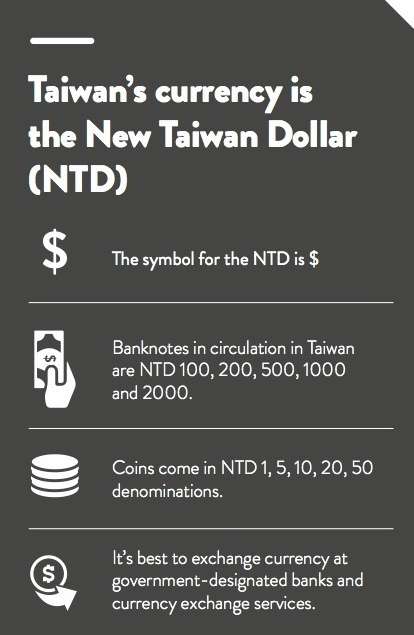
You successfully shared the app
https://taiwancsp.shareableapps.com/
Tap and hold link above to copy to clipboard.
Are you sure you want to delete this message?
Taoyuan International Airport: The main international gateway to and from Taiwan. TPE is 50 kilometres west of Taipei, and there are regular direct flights from Sydney, Brisbane, and Melbourne. Many local bus lines leave for main stops in Taipei. To avoid Taipei's traffic jams, high-speed rail is a good option, switching to Taipei's MRT system at either Banqiao or Taipei HSR stations. Taxis are readily available.
Taipei (Songshan) International Airport: Located within metropolitan Taipei, and easily accessible via the MRT system. It mainly serves domestic routes with limited flights to China, Japan, and South Korea.
Kaohsiung International Airport and Taichung Airport: International airports serving the central and southern parts of Taiwan. They also offer flights to major cities in North Asia and Southeast Asia.
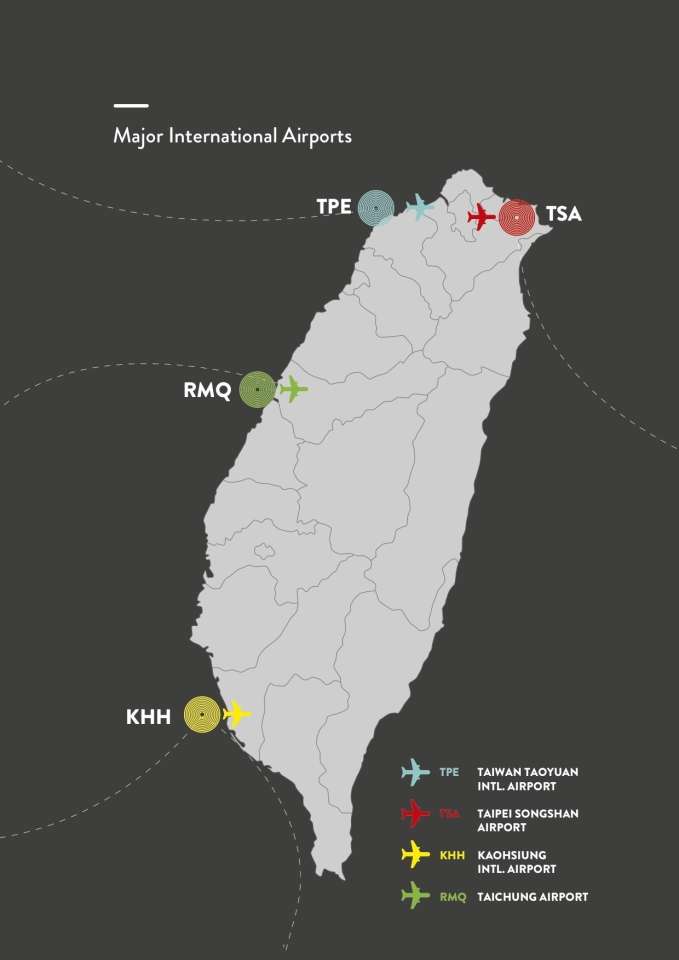
You can use your Australian mobile phone straight off the aeroplane in Taiwan, but international roaming charges can be quite costly. It may be much cheaper to buy a prepaid local SIM card upon arrival if your phone has been unlocked in Australia. Two forms of photo ID are required when buying a prepaid card.
Major mobile service providers in Taiwan include Chunghwa Telecom, Taiwan Mobile, Far EasTone, and T Star. For a short business trip, an option is a prepaid SIM card with unlimited data plans that run on a three, five, or seven-day basis from Chunghwa Telecom and Taiwan Mobile.
The 'iTaiwan Government Indoor Public Area Free WiFi Access' service allows international travellers to use free wireless internet for 30 days (extendable to up to 90 days) throughout Taiwan. To use the service, you need to apply for an iTaiwan account in advance and activate it after arrival. See: itaiwan.taiwan.net.tw/HowTo
Voltage and plugs: The standard in Taiwan is 110 volts at 60 cycles. Like Japan, Taiwan uses type A/B power sockets. Australian-bought electrical appliances will need adaptors.
You successfully shared the app
https://taiwancsp.shareableapps.com/
Tap and hold link above to copy to clipboard.
Are you sure you want to delete this message?
Taxis: They are everywhere, most are yellow and well marked, fares are relatively low and metered. Traffic can be a drawback during peak hours. For long-distance travel, the meter may not be used. It is advisable to confirm how you will be charged and agree on a deal before taking a taxi. To call a taxi in Taipei, ring the toll-free taxi hotline at 0800-055-850. In Kaohsiung, call 0800-087-778.
Buses: The cheapest way to travel around Taiwan. Inter-city buses, city public buses and tour buses are all readily accessible in major cities. Buses in Taipei accept coins, notes or EasyCard, highly recommended as it is can be used for other types of public transportation including MRT, taxis, ferries, and the bicycle-sharing system.
TRA: Taiwan's public railway network offers both long-distance express trains and local commuter trains with more than 200 stations around the island. For information, timetables and reservations, visit: railway.gov.tw/en.
THSR: The high-speed rail system provides a 300 km/h service with eight stations along the western corridor of the island: Taipei, Banqiao, Taoyuan, Hsinchu, Taichung, Chiayi, Tainan and Zuoying in Kaohsiung. For ticket information see: thsrc.com.tw/en.
MRT: Taiwan's Mass Rapid Transit system is the most popular and convenient form of transportation in Taipei and Kaohsiung. Tickets can be bought from ticket vending machines or information counters at metro stations. Alternatively, buy an EasyCard for a convenient 'touch and go' payment method. iPASS cards are used in Kaohsiung.
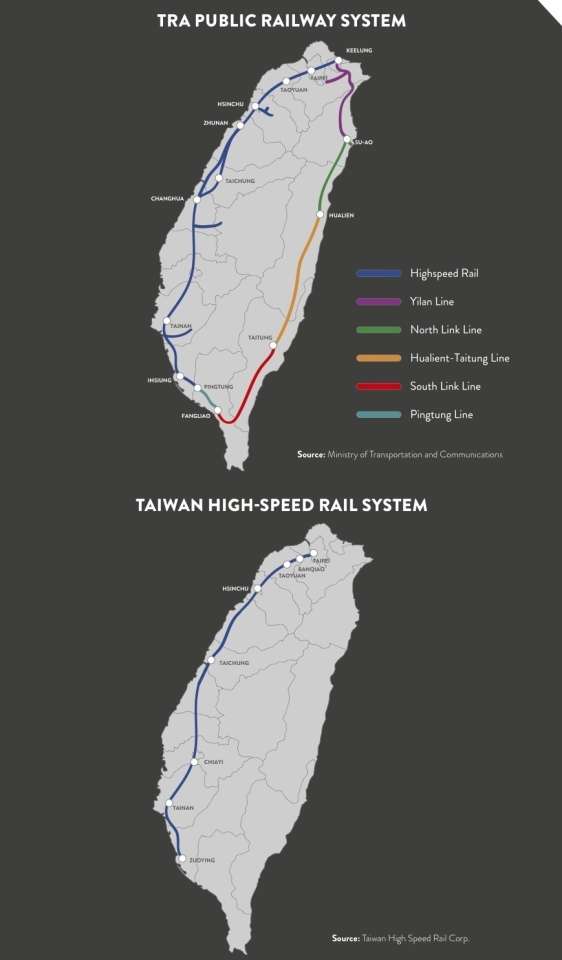
You successfully shared the app
https://taiwancsp.shareableapps.com/
Tap and hold link above to copy to clipboard.
Are you sure you want to delete this message?
With about 2.6 million inhabitants and numerous international visitors, Taipei is a well‑developed, energetic metropolis. The western districts are considered old Taipei, while eastern Taipei is modern and international with classy malls, stylish boutiques, hotels, and restaurants. Xinyi and Da'an are the commercial and financial districts. Xinyi is a newly developed area with wide streets, tall buildings, and numerous business hotels. It is home to landmark skyscraper Taipei 101, the International Convention Centre, and the World Trade Centre. Da'an is a bustling commercial area with big department stores, popular restaurants and bars. Staying in these districts is the best option for business travellers.
Calling Taipei a 'food heaven' is not an overstatement. It offers some of the most diverse, rich and high quality food in the world. As in Australia, tipping is not common in Taiwan, although some restaurants or top-end hotels include a service charge of 10 to 15 per cent in the final bill.
You successfully shared the app
https://taiwancsp.shareableapps.com/
Tap and hold link above to copy to clipboard.
Are you sure you want to delete this message?
Most of the following has been provided by the Australian Government's Department of Foreign Affairs and Trade as general advice. See smartraveller.gov.au for regularly updated information.
Take out comprehensive travel insurance that will cover any medical costs. The Australian Government will not pay for a traveller's overseas medical expenses or medical evacuation costs.
Dengue fever occurs in Taiwan, particularly in the tropical southern/central regions. There is no vaccine against it, so avoid mosquito bites and use repellent. Up to two months before departure, consult your doctor or Health Service Australia to find out what injections you should have before visiting Taiwan. For more information see the World Health Organization and DFAT's health page.
Flooding and mudslides are common during the typhoon season between May and November. The Taiwan Central Weather Bureau website has up-to-date information on earthquakes, typhoons and other severe weather. A 'typhoon day' can be declared at very short notice. Destructive tsunamis often occur in the Indian and Pacific oceans due to earthquakes, which do occur in Taiwan. Information on natural disasters can be obtained from the Global Disaster Alert and Coordination System website.
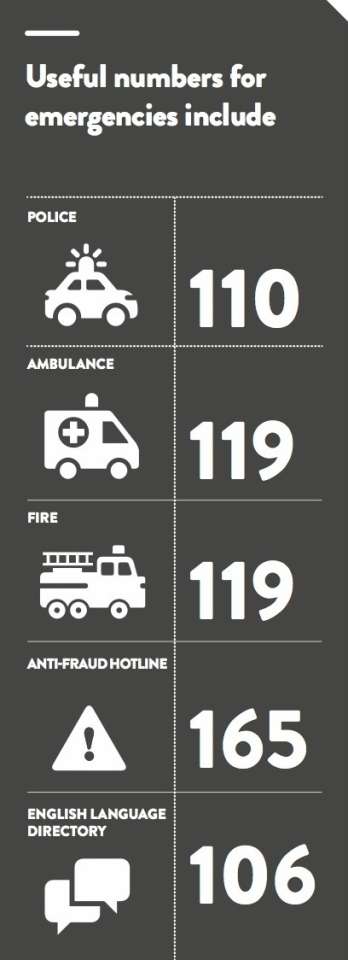
Taiwan is a relatively safe destination for international travellers. The violent crime rate is low, as is petty crime. But be aware of pickpocketing and street theft, and be cautious around high crime areas including barbershops, massage parlours and nightclubs. Avoid demonstrations and large public protests.
Penalties for drug offences are severe and include the death penalty. Smoking or possessing marijuana can lead to life imprisonment. Check the DFAT website for more information on the drug issue. Some Australian criminal laws apply to Australians overseas and may be prosecuted in Australia.
Taiwan recognises dual nationality. Australian/Taiwanese dual citizen males over 18 years of age may subject to compulsory military service in Taiwan.
You successfully shared the app
https://taiwancsp.shareableapps.com/
Tap and hold link above to copy to clipboard.
Are you sure you want to delete this message?
You successfully shared the app
https://taiwancsp.shareableapps.com/
Tap and hold link above to copy to clipboard.
Are you sure you want to delete this message?

Asialink Business provides high-calibre opportunities for Australian businesses to build the Asia capability of their executives and team members. Our business-focused cultural competency programs, professional development opportunities and practical research products allow businesses to develop essential knowledge of contemporary Asian markets, business environments, cultures and political landscapes.
PwC Australia is a member of a network of firms in 157 countries with more than 195,000 people committed to delivering quality in assurance, advisory, tax and legal, and private client services - pwc.com.au/asia-practice
You successfully shared the app
https://taiwancsp.shareableapps.com/
Tap and hold link above to copy to clipboard.
Are you sure you want to delete this message?
You successfully shared the app
https://taiwancsp.shareableapps.com/
Tap and hold link above to copy to clipboard.
Are you sure you want to delete this message?
You successfully shared the app
https://taiwancsp.shareableapps.com/
Tap and hold link above to copy to clipboard.
Are you sure you want to delete this message?
You successfully shared the app
https://taiwancsp.shareableapps.com/
Tap and hold link above to copy to clipboard.
Are you sure you want to delete this message?
You successfully shared the app
https://taiwancsp.shareableapps.com/
Tap and hold link above to copy to clipboard.
Are you sure you want to delete this message?
You successfully shared the app
https://taiwancsp.shareableapps.com/
Tap and hold link above to copy to clipboard.
Are you sure you want to delete this message?
This app requires Google Chrome to continue. Tap the icon, copy link, then paste into Chrome
This app requires Google Chrome to continue. Tap the icon, Open in browser, then choose Chrome
Taiwan CSP
| App category: | Other |
| Updated: | September 19, 2019 |
| App Publisher: | Asialink Business |
| Compatible with: | iOS 6+, Android 4+, Blackberry 10+ and Windows Phone 8+. |
| Legals: | Terms of use |
You successfully shared the app
You successfully shared the app
https://taiwancsp.shareableapps.com/
Tap and hold link above to copy to clipboard.
Are you sure you want to delete this message?
You successfully shared the app
https://taiwancsp.shareableapps.com/
Tap and hold link above to copy to clipboard.
Are you sure you want to delete this message?